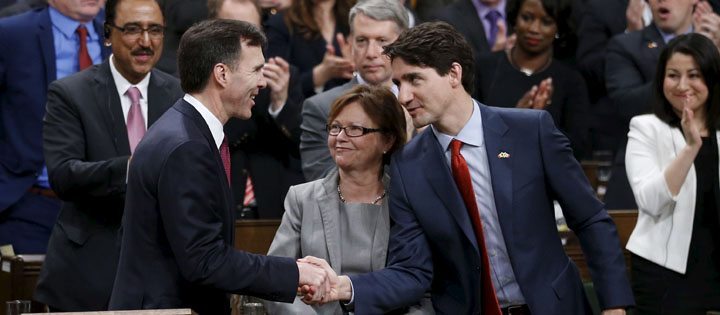Canada’s fiscal books are heading back into the red.
The federal government will post a $29.4 billion deficit in the 2016-2017 fiscal year, Finance Minister Bill Morneau revealed this afternoon. It’s a shortfall that’s nearly three times the $10 billon promised during the election campaign.
That deficit is expected to grow to $98.9 over four years, the Liberals reported in their inaugural budget, a fiscal plan that includes significant investments in affordable housing, clean energy, infrastructure, aboriginal communities and employment insurance.
Under Budget 2016, unemployed Canadians in 12 affected unemployment regions — largely located in Alberta, Saskatchewan and Newfoundland — will be able to claim EI for 70 weeks. The extended benefits will be available for one year and “will be applied retroactively to all eligible claims as of January 4, 2015,” the government said.
Read Also

Farming Smarter receives financial boost from Alberta government for potato research
Farming Smarter near Lethbridge got a boost to its research equipment, thanks to the Alberta government’s increase in funding for research associations.
Canadians outside the 12 high-unemployment regions will see their regular benefits extended by five weeks to 50 weeks. The new rules also reduce EI claim times with claimants only required to wait one week to file.
For Canadian agriculture, there are several areas of note.
Canadian dairy farmers looking for more details on a promised compensation package for concessions made under the CETA deal are out of luck. This, despite International Trade Minister Chrystia Freeland indicating the deal could be ratified by 2017.
Meanwhile, questions around a promised $160 million Agri-Food Value Added Investment Fund continue to go unanswered. Budget 2016 bears no mention of the fund, despite it being a major platform plank and a key priority in Agriculture Minister Lawrence MacAulay’s mandate letter.
Canadian food processors, however, are invited to partake in a public consultation to “eliminate tariffs on food manufacturing ingredients other than supply-managed products” in order to boost investment and job creation.
The Liberals did uphold their election promise to boost funding for Canada’s beleaguered Canadian Food Inspection Agency. Under Budget 2016, the agency will receive $38.5 million over two years to “help target inspection activities to the highest-risk domestic and imported foods.”
“The agency will also enhance inspection actives abroad to assist in responding to food safety risks before they reach domestic consumers,” the budget reads.
The Liberals have allocated $41.5 million in cash starting in 2016-2017 to modernize and repair select Agriculture Canada and CFIA research stations in five provinces: British Columbia, Alberta, Saskatchewan, Ontario and Quebec.
Government officials were unable to provide a list of which stations in those provinces had been earmarked for funding.
Budget 2016 also includes $30 million over six years for agriculture genomics research. That differs from the $100 million over four years the Liberals earmarked in their election platform.
Further agricultural research funding, the budget said, may be allocated at a later date. Those announcements depend on the outcome of a comprehensive review by Science Minister Kirsty Duncan of Canada’s scientific funding model for which Tuesday’s budget did not give a timeline.
Meanwhile, Canadian producers hoping for a solution to the industry’s ongoing labour woes are out of luck.
While the Liberals said they are committed to bringing in 300,000 permanent residents in 2016, the budget bears no mention of reforms to the Temporary Foreign Worker Program. Nor does it include a commitment to creating pathways to permanent residency specifically for agriculture and agri-food workers.
The Liberals have promised to review the controversial TFWP program, although no timeline has been given. However, Canadian agriculture had been hoping for an exemption to the fast approaching July 1 cap that will restrict the number of foreign workers companies can hire to 10 percent of their workforce.
Fixing the industry’s labour crunch isn’t the only agriculture issue left unresolved. Canadian produce growers are still without a payment protection program that would help them go after buyers with outstanding payments.
Canadian fruit and vegetable growers lost their preferential status under the U.S Department of Agriculture’s Perishable Agricultural Commodities Act in 2014 because similar coverage wasn’t being offered to American exporters.
Liberal MP Mark Eyking, then the party’s agriculture critic, promised to fix the PACA issue during the election campaign.
On the water front, the federal government reiterated its commitment to working with the Government of Saskatchewan to continue transferring federally owned dams to the Saskatchewan Water Security Agency “to better serve Saskatchewan’s water and water infrastructure needs.”
The Liberals have also promised $500 million over five years for broadband internet in rural areas.

















